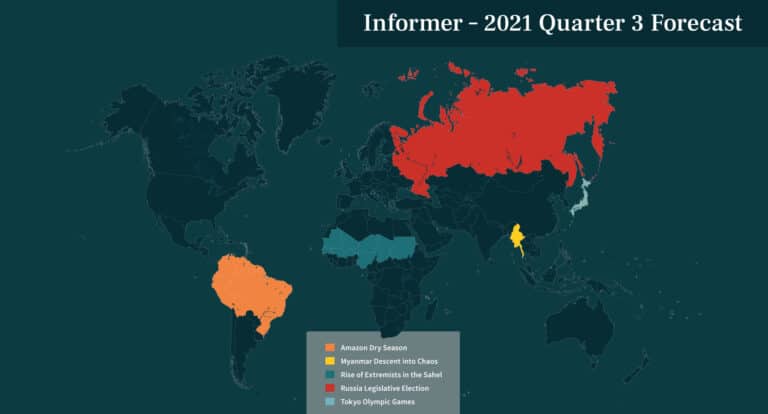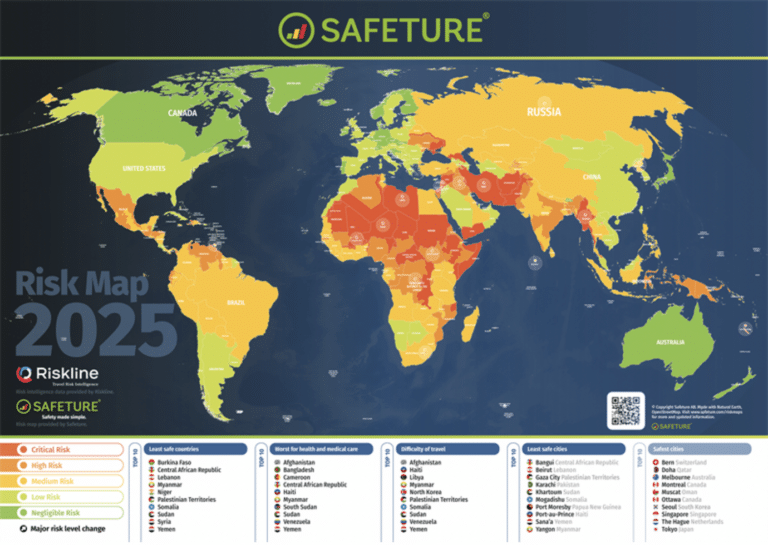Review the 2021 Q3 Forecast by Riskline
Amazon Dry Season
The upcoming Amazon dry season poses a risk of wildfires, exacerbated by a lack of efforts to combat deforestation. As Brazil’s President Jair Bolsonaro dismantled environmental protection agencies and policies, the Amazon has seen large wildfires in 2019 with deforestation rates reaching a 12-year high in 2020. Meanwhile, the frequency of wildfires also increased in the Amazon regions of Colombia, Peru and Venezuela.
While Bolsonaro has faced international backlash for reversing Brazillian efforts to reduce deforestation, other governments have also allowed agribusiness and mining to expand in their countries. Over 2,300 illegal gold mines have been identified in Brazil, Bolivia, Colombia, Peru, Ecuador and Venezuela. Venezuela has increasingly relied on gold mining in response to the continuing economic crisis, while the Amazon region in Colombia saw an increase in logging and mining following the 2016 peace accord with the left-wing Revolutionary Armed Forces of Colombia (FARC) guerilla group. With a lack of efforts being made to combat deforestation, the risk of similar wildfires are likely during the upcoming Amazon dry season.
Myanmar’s Descent into Chaos
The court trial of Myanmar’s ousted leader Aung San Suu Kyi which began on 14 June, will conclude in late July. Suu Kyi faces several criminal charges, including possession of illegal walkie-talkies during the 2020 elections and corruption. Activists opposed to Suu Kyi’s arrest have protested daily in urban areas of Nay Pyi Taw and Yangon. Security forces have often clashed violently with protesters, with over 800 people killed since the military takeover on 1 February. Protests have the potential to escalate to further widespread unrest if Suu Kyi is convicted. There is a high likelihood that Suu Kyi and her supporters will get life imprisonment as seen in previous similar trials during the military rule in 1962-2010, as most of the judges are appointed by the military.
The fighting by rebel groups opposed to military rule is also likely to intensify in Shan, Kachin and Kayah states in the near-term due to the emergence of a coalition of rebel groups in opposition to the military. In May 2021, the People’s Defense Forces, an army of the National Unity Government in exile, was formed by partnering with multiple ethnic militia groups. As of 21 June, at least 100,000 people have been displaced in the fighting between Tatmadaw and rebels in eastern Myanmar; as the fighting intensifies in the near-term, thousands more civilians will likely be displaced to neighbouring countries.
Rise of Extremists in the Sahel
Following Mali’s second coup in nine months, French President Emmanuel Macron announced the gradual withdrawal of French troops from Africa’s Sahel region, and the end of Operation Barkhane, which will be replaced by a broader international counter-terrorism mission. The G5-Sahel countries of Burkina Faso, Chad, Mali, Mauritania and Niger have previously warned France against a rapid withdrawal, which would likely lead to an increase in violence perpetrated by groups aligned to Al-Qaeda and the Islamic State (IS).
Even before the announcement, attacks had been on the rise in the Sahel, with emboldened militants carrying out attacks across the region. Efforts aimed at containing the threat have prevented militants from gaining control over large swathes of territory, but have failed to deter large-scale attacks or address the underlying causes driving the insurgency. Any international withdrawal from the Sahel is likely to lead to more violence in the near-term, and will encourage transnational militant groups to establish a new base from which to plot and carry out attacks across Africa and beyond in the long-term.
Russian Legislative Election
Elections for the 450 seats in the Russian parliament’s lower house (State Duma) will happen on 17-19 September 2021. State-run polls show the current rating of the pro-Putin United Russia (UR) party is around 30 percent, 10 percent lower than before the 2016 elections. As for the Communist (CPRF), Liberal Democratic (LDPR) and Just Russia (SR) parties, generally docile and supportive of the Kremlin’s initiatives, their combined rating stands at around 30 percent. In the run-up to the election, the Kremlin has stepped up its crackdown on critics, especially on organisations tied to Alexei Navalny – a prominent anti-Putin figure – which were declared ‘extremist’ and banned from the elections on 9 June. Navalny’s supporters will likely oppose UR through Smart Voting, a mechanism aimed at consolidating votes from those who oppose UR. As social networks are the opposition’s main communication platforms, the Kremlin has intensified efforts to control online content.
Despite this, the 2021 State Duma elections are unlikely to significantly change the Russian political context and will undoubtedly see the ruling UR retain control of the lower house. In tandem, a rise in protectionism and nationalist rhetoric is likely during autumn.
Tokyo Olympics
The postponed Tokyo 2020 Summer Olympic games are scheduled to be held in Tokyo and several other Japanese cities from 23 July-8 August. The games will not allow inbound foreign spectators and domestic spectators will be capped at the lesser of 10,000 spectators or 50% of capacity per venue. Heightened security and associated disruptions to overland travel are still likely in the vicinity of Olympic venues due to the sheer scale of safely transporting thousands of athletes and managing hundreds of events across multiple venues. Along with the added measures to prevent the spread of COVID-19.
An influx of domestic tourists in Tokyo and other cities with Olympic venues is possible despite government advisories against inter-prefectural movements over COVID-19 concerns. Traffic disruptions are expected on parts of the Shuto Expressway and other major roads in and around Tokyo, as priority lanes will be set for Olympics-related vehicles. Furthermore, anti-Olympics protests may take place due to the dissatisfaction over holding the games despite the risks of spreading COVID-19.

